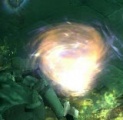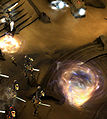Difference between revisions of "Energy Twister"
Brokenstorm (talk | contribs) |
Brokenstorm (talk | contribs) (removed noincludes) |
||
| Line 1: | Line 1: | ||
| − | |||
[[File:IconEnergyTwister.png|left]] | [[File:IconEnergyTwister.png|left]] | ||
'''Energy Twister''' is an Offensive [[Wizard skill]] unlocked at [[clvl|Level]] 11, summoning a twister made out of energy that hurts everything nearby. | '''Energy Twister''' is an Offensive [[Wizard skill]] unlocked at [[clvl|Level]] 11, summoning a twister made out of energy that hurts everything nearby. | ||
| Line 84: | Line 83: | ||
[[category:Wizard skills]] | [[category:Wizard skills]] | ||
[[category:Active skills]] | [[category:Active skills]] | ||
| − | |||
Revision as of 23:04, 19 September 2011
Energy Twister is an Offensive Wizard skill unlocked at Level 11, summoning a twister made out of energy that hurts everything nearby.
Contents
Background

Combining magical force and air, the Wizard brings a continuous, but time limited, twister out of the aether to destroy enemies.
Skill Effects
The following is a very quick list. See the Energy Twister rune effects page for a more thorough summary of rune effects, or any of the individual rune pages for numbers, screenshots, blue quotes, and much more.
| Icon | Skill | Description |
|---|
| {{{icon}}} | [[{{{name}}}]] Force |
13 | {{{desc}}} |
| Wicked Wind |
[e] Twister no longer travels but spins in place dealing 84% weapon damage per second as Arcane to everything caught within it. |
| Gale Force |
[e] Increase damage to 132% weapon damage per second as Arcane. |
| Mistral Breeze |
[e] Reduce casting cost to 14 Arcane Power. |
| Raging Storm |
[e] When two twisters touch they merge into a tornado with an increased area of effect that causes 100% weapon damage per second as Arcane. |
| Trail of Destruction |
[e] Casting Energy Twister grants you a Wind Charge. You can store up to 5 Wind Charges at a time. Casting an Signature spell releases all Wind Charges as a giant Energy Twister that deals 25% damage per Wind Charge. Signature spells are: Magic Missile, Shock Pulse, Spectral Blade, Electrocute. |
Note: Information is based on a level 60 character and rank 7 runestones.
Skill Design
This skill sends out a twister from the Wizard, moving slowly away from the caster in roughly a straight line and doing moderate damage to everything it hits. It appears impressive, but it's high resource cost makes it only suitable for occasional use.
Synergies
Energy Twister benefits from the following Wizard passives:
| Skill | Unlocked | Description |
|---|
| {{{icon}}} | [[{{{name}}}]] | 45 | {{{desc}}} |
Development
Energy Twister was first shown at BlizzCon 2008 when the Wizard debuted, then named Tornado and placed at Tier IV on the Storm Skill Tree. For BlizzCon 2009, this skill was moved to Tier III and renamed Energy Twister. Why the name was changed is unknown, but the functionality remained roughly the same. Flux tried it out in the PvM demo:[1]
This one was impressive, but very unpredictable. The graphic is great; you can see that in the Blizzcon 2009 gameplay movie, and it does more in more or less a straight line, but without some sort of tank I didn’t find it very easy to hit enemies with. Arcane Orb was nearly as damaging, far easier to aim, and cheaper on the mana. This Wizard just has so many cool active spells to try out it’s impossible to get a handle on everything in a short play time.
Energy Twister was available in the BlizzCon 2010 demo, but wasn't one of the Wizard's starting skills. Skill tiers were removed for the July 2011 Press Event, and Energy Twister became a level 11 skill.
Previous Versions
See the Wizard skill archive for more details on previous versions of Energy Twister (or Tornado) and other Wizard skills.
In Other Games
Energy Twister is akin to the Druid's skill Twister from Diablo II.
Media
Energy Twister can be seen in action on video here:
- Gameplay: Blizzcon 2008
- Video: Blizzcon 2010 Rune Effects
- Video: August 2011 Wizard Skill Animations
You can find pictures in the Diablo III screenshot and picture gallery:
References
- BlizzCon 2009 Full Wizard Skill Trees
- Zediono's translation of JudgeHype's pre-beta report -- IncGamers 1st Aug 2011
- Silva's Wizard Runestone Effects -- IncGamers 5th Sep 2011
- Wizard Active Skills -- Diablo III 12th Sep 2011
| Classes of the Diablo games |
Skills - Active skills - Skill runes - Passives - Resource - Movement ability [e] Barbarian Demon Hunter Monk Necromancer Witch Doctor Wizard Followers Other Classes Fan-made |
|---|
| The Barbarian | Fury - Barbarian Active Skills (Archive) | Barbarian Passive Skills (Archive) [e] | |||
|---|---|---|---|---|---|
|
|
Primary Might |
Secondary Tactics |
Defensive Rage |
Pound of Flesh (10) |
Superstition (30) |
| (X) = the level at which the skill becomes unlocked. | |||||
| Barbarian skill categories: Primary Secondary Defensive Might Tactics Rage |
|---|
|
Bash |
Cleave |
Frenzy |
[e] |
|
Hammer of the Ancients |
Rend |
Seismic Slam |
Whirlwind |
[e] |
|
Ground Stomp |
Leap |
Sprint |
Ignore Pain |
[e] |
|
Ancient Spear |
Revenge |
Furious Charge |
Overpower |
[e] |
|
Weapon Throw |
Threatening Shout |
Battle Rage |
War Cry |
[e] |
|
Earthquake |
Call of the Ancients |
Wrath of the Berserker |
[e] |
| Demon Hunter skill categories: Primary Secondary Defensive Hunting Devices Archery |
|---|
|
Hungering Arrow |
Entangling Shot |
Bola Shot |
Grenades |
[e] |
|
Impale |
Rapid Fire |
Chakram |
Elemental Arrow |
[e] |
|
Caltrops |
Smoke Screen |
Shadow Power |
[e] |
|
Vault |
Preparation |
Companion |
Marked for Death |
[e] |
|
Evasive Fire |
Fan of Knives |
Spike Trap |
Sentry |
[e] |
|
Strafe |
Multishot |
Cluster Arrow |
Rain of Vengeance |
[e] |
| Monk skill categories: Primary Secondary Defensive Techniques Focus Mantras |
|---|
|
Fists of Thunder |
Deadly Reach |
Crippling Wave |
Way of the Hundred Fists |
[e] |
|
Lashing Tail Kick |
Tempest Rush |
Wave of Light |
[e] |
|
Blinding Flash |
Breath of Heaven |
Serenity |
Inner Sanctuary |
[e] |
|
Dashing Strike |
Exploding Palm |
Sweeping Wind |
[e] |
|
Cyclone Strike |
Seven-Sided Strike |
Mystic Ally |
[e] |
|
Mantra of Evasion |
Mantra of Retribution |
Mantra of Healing |
Mantra of Conviction |
[e] |
| Necromancer skill categories: Primary Secondary Corpses Blood and Bone Reanimation Curses |
|---|
| Witch Doctor skill categories: Primary Secondary Defensive Terror Decay Voodoo |
|---|
|
Poison Dart - Rune effects |
Corpse Spiders |
Plague of Toads |
Firebomb |
[e] |
|
Grasp of the Dead |
Firebats |
Haunt |
Locust Swarm |
[e] |
|
Summon Zombie Dogs |
Horrify |
Spirit Walk |
Hex |
[e] |
|
Soul Harvest |
Sacrifice |
Mass Confusion |
[e] |
|
Zombie Charger |
Spirit Barrage |
Acid Cloud |
Wall of Zombies |
[e] |
|
Gargantuan |
Big Bad Voodoo |
Fetish Army |
[e] |
| Wizard skill categories: Primary Secondary Defensive Force Conjuration Mastery |
|---|
|
Magic Missile |
Shock Pulse |
Spectral Blade |
Electrocute |
[e] |
|
Ray of Frost |
Arcane Orb |
Arcane Torrent |
Disintegrate |
[e] |
|
Frost Nova |
Diamond Skin |
Slow Time |
Teleport |
[e] |
|
Wave of Force |
Energy Twister |
Hydra |
Meteor |
Blizzard |
[e] |
|
Ice Armor |
Storm Armor |
Magic Weapon |
Familiar |
Energy Armor |
[e] |
|
Explosive Blast |
Mirror Image |
Archon |
[e] |
| Followers | Kormac the Templar | Lyndon the Scoundrel | Eirena the Enchantress [e] | |||
|---|---|---|---|---|---|---|
|
Level 10: |
Level 5: Level 10: |
Level 15: |
Level 15: Level 20: |
Level 25: Level 30: | ||
| Diablo III Other Classes | Diablo II Classes | Diablo I Classes [e] | ||||
|---|---|---|---|---|---|---|
|
Archetypes: |
Archetype sub-types: |
Other classes: |
Diablo II: |
|||
| Fan-made Classes | Fan-made Skills [e] | ||||
|---|---|---|---|---|---|
|
• Alchemist |
• Flagellant |
• Ranger |
Dragon Warrior Skills |
Aurian Mage Skill | |
| | |||||


